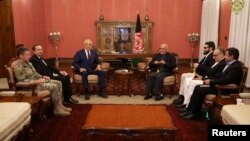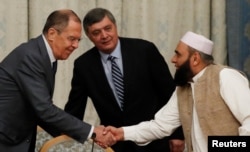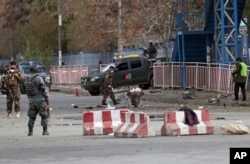Afghanistan's government says the presidential election will proceed as scheduled on April 20, rejecting a reported U.S. proposal seeking postponement of the democratic process.
The Trump administration is discussing whether to ask the Kabul government to suspend the coming polls as Washington considers options to engage the Taliban in peace talks to end the 17-year Afghan war, according to the Wall Street Journal.
Spokespeople for President Ashraf Ghani, who is seeking a second five-year term in the election, insisted the Independent Election Commission has announced the election date and the government’s commitment to stick to it is “unwavering.”
“Afghanistan is a democracy and any transfer of power has to be done through a democratic process. Any other proposals that runs contrary to the Afghan constitution and people’s will not be acceptable to our people,” tweeted presidential aide Fazel Fazly.
U.S. special envoy on Afghanistan reconciliation, Zalmay Khalilzad, reportedly raised the idea in talks with various stakeholders and intermediaries as he pushes for negotiating a political breakthrough in the war with the Taliban.
Khalilzad concluded a three-day visit to Kabul on Monday, his second trip to the country since taking office in September. The U.S. embassy said he met with a number of Afghan stakeholders, both in and outside the government and “reiterated the United States government’s support to promote the negotiations among Afghans required to bring the conflict to an end.”
The reported proposal seeking suspension of coming presidential polls sparked a heated debate in the Afghan media. While the government has criticized the idea, some people outside the government say the move could boost peace efforts and help de-escalate battlefield hostilities.
The debate prompted U.S. Ambassador to Kabul, John Bass, to intervene.
“We remain committed to helping the electoral commissions and the Afghan government prepare for presidential elections in April 2019. Timing of Afghan elections is for Afghans to decide,” Bass tweeted.
Haji Din Mohammad, the deputy chief of the country’s High Peace Council overseeing reconciliation efforts with the Taliban, underscored the importance of elections, but said peace talks must be given priority in the interest of Afghanistan.
“If the presidential elections are to be delayed in favor of peace negotiations [with the Taliban], it would require intense political debates on the subject to allow the people of Afghanistan to make a final determination,” Mohammad said.
The Afghan peace negotiator supported Khalilzad’s mission, saying, “we are thirsty for peace and we will support any sincere and transparent” effort in this direction.
“As far as I know, Khalilzad has been given six months to produce an outcome for the [U.S.] administration."
The Trump administration has engaged the Taliban in direct talks, meeting a longstanding insurgent demand. Since July, there have been two publicly known meetings between the two sides in Qatar, where the Taliban maintains its so-called “political office.”
Russian presidential envoy on Afghanistan, Zamir Kabulov, said Monday that in recent months the Taliban has also held 10 secret consultations with the United States in the Gulf state in recent months.
The latest declared meeting in Doha, the Qatari capital, took place last month when Khalilzad led the U.S. team and the two sides agreed to sustain the dialogue.
The peace initiative comes as Taliban insurgents have intensified battlefield attacks, killing scores of Afghan security personnel and overrunning new districts. The Afghan government’s territorial control across the country has fallen to its lowest level since 2015.
The Taliban refuses to engage in peace talks with the Afghan government until it reaches a deal with the United States on withdrawal of all foreign troops from Afghanistan. Insurgent delegates at last week’s Moscow-hosted multilateral meeting on Afghanistan reiterated the demand.
Russia justified its hosting of the peace conference, alleging the United States and NATO have failed to end the war and negotiate an Afghan peace process. The Taliban's presence at the 12-nation meeting was their first public appearance since the U.S.-led military intervention ousted the group from power in 2001 after September attacks on American cities.
A new survey released last week said 147,000 people in Afghanistan have died during the war and the casualties continue to grow.






